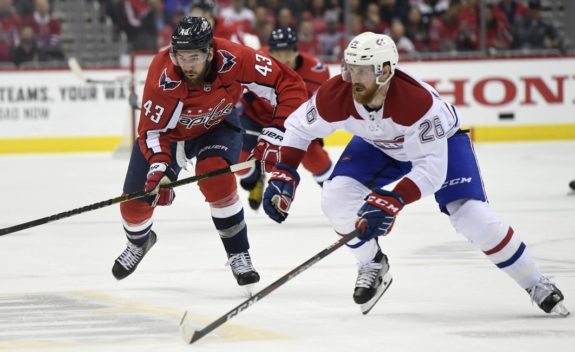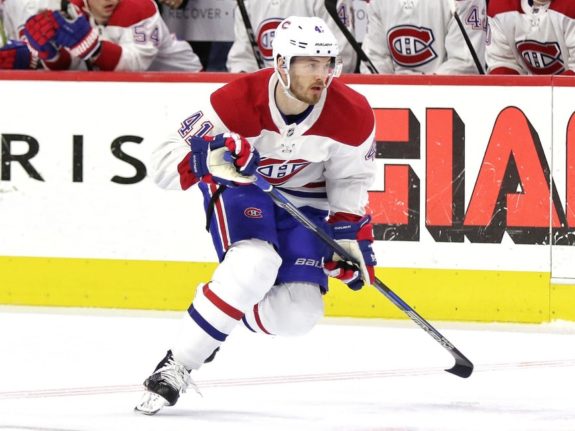The Montreal Canadiens have had an up-and-down start to the 2019-20 season, to say the least. There have been games when they’ve been the fast, skilled, in-rhythm team that seems unbeatable. Then there have been games, like the home opener against the Detroit Red Wings, when they weren’t skating and seemed lost. Recently, they’ve played like the former; with a 7-2-2 record in their last 11 games. This has them second in the Atlantic Division behind the Boston Bruins.

Just 21 games aren’t enough to judge any team but, there have already been major pendulum swings. The Buffalo Sabres didn’t have a problem out of the gate, yet they have just one win in their last nine games. After an abysmal start to their season, the San Jose Sharks look more like themselves, winning six of their last seven.
For the Canadiens, there have been more positives than negatives after 21 games. That is easy to say after they’ve won six of their last eight, but don’t be fooled, there is still work to be done if they want to make the playoffs in the ever-so-tight Eastern Conference and, more specifically, the Atlantic Division. However, there have also been good things the team has done up to the quarter mark.
Positive: Tatar-Danault-Gallagher
Many analysts are calling this a top-five line in the NHL, and for good reason. Head coach Claude Julien relies on this line for every situation in any given game. A goal, a defensive-zone faceoff, or a key match-up late in a game, this line is a Swiss Army knife, with a reliable center who wins faceoffs, a workhorse who can score from anywhere, and a finesse finisher who’s not defective defensively.

Most importantly, this line drives play at 5-on-5 by possessing the puck for an enormous amount of the game. They receive the most ice time from Julien because they can swallow up any line in the league defensively and overwhelm them as a unit. This is due to how they’re built, as they start with possession from most draws (Danault is at 52.5% in faceoff wins). This is key to their ice time, as well as their overall production. The line has combined for 52 points this season and boasts a steady and balanced attack. Their combination of being reliable defensively, tough to play against and offensively inclined is what makes them so good.
Negative: Late Goals Against
Nothing drives a head coach crazier than his team giving up a goal late in a period. It shifts momentum and can dictate what will transpire in the following period. The Canadiens happen to lead the league in this regard, surrendering 11 in 20 games.
Against the New Jersey Devils last Saturday, Montreal can say that the referees blew the game and cost them the win. That may be true in a sense, but the fact is they gave up two late-period goals which affected the momentum in the game and could have been avoided.
In the first late goal in the first period, the Habs lost too many one-on-one battles before Nikita Gusev finally potted one into an open net. This type of situation has plagued the Canadiens countless times this season and though it’s a glaring problem, it’s also happenstance.
Their lack of awareness to end a period has also hurt the Canadiens. In the second late goal in the second period against the Devils, Nick Suzuki needed to realize that there was only ten seconds left on the clock and make the safe play. Instead, he whipped a risky pass across the ice which was picked off by the Devils who scored shorthanded. At the time of the goal, Montreal was up 3-1 and on the power play. Nico Hischier’s late goal allowed New Jersey to grab the momentum heading into the final frame.
Positive: Jeff Petry
While Shea Weber has been lighting the lamp a lot for the Habs lately, a second pairing player on the right side who plays the most minutes on the team has been their most steady d-man over the past three seasons.

Jeff Petry has been a workhorse for the Habs this season. He averages 24:31 minutes of ice time and makes the most of it. He’s not flashy but if you could point to the most solid all-around player in Montreal it would be Petry. His Corsi-for percentage is 56.0 up from his career average of 50.9, which fits in well with the Canadiens’ puck possession and speed game. He plays on the power play, penalty kill, and in overtime while making minimal mistakes and chipping in offensively.
Since he arrived at the trade deadline four seasons ago, Petry has been the most consistent Canadiens rearguard. His contract (six years, $5.5 million AAV) is one of the better bargains in the league, which general manager Marc Bergevin deserves credit for, since he only gave up a second-round pick to acquire the defenceman from the Edmonton Oilers. His next contract should be interesting, as he’ll be 33 years old, but the current one suits the team just fine.
Negative: Paul Byron and Artturi Lehkonen
Much has been made of Montreal’s organizational depth which many believe is the reason they’ve had success this season. Yet two key members of the forward group really need to step up their play and production. Paul Byron has been invisible for much of this season, surprising for a player whose best attribute is his breakaway speed. He’s a two-time 20-goal scorer since being claimed off waivers by Bergevin in 2015, which earned him a four-year contract worth an AAV of $3.4 million.

Though he put up 15 goals in 56 games last season, he’s come into this season with nothing. After four points in 19 games, Byron underwent knee surgery and will be out for approximately four weeks. Maybe this injury has plagued him all season and we can expect the old speedy, breakaway-scoring Byron back after he rehabilitates but, either way, he needs to step up his play to justify his contract. He’s had no problem proving people wrong over the course of his career.
Arturri Lehkonen is hard to define. He was a second-round pick in 2013 who scored 18 goals in his rookie season which raised expectations. He’s a responsible player with a 200-foot game and, therefore, he’s been able to stay in the lineup through scoring slumps. He’s also a positive possession player (CF 51.7%) and has been his entire career. He is simply a smart, top-nine forward who can get between 20-30 points per season.

He’s on a two-year contract worth $2.4 million AAV, and the coaching staff needs to realize that the doesn’t belong in the top six long-term, because of his inability to finish. Perhaps he’s just snake-bitten, but it’s been two seasons of the same bad “puck luck”, so maybe it’s his norm. The team needs to clearly identify Lehkonen’s role, and stop expecting him to be a top-six offensive player, which he clearly is not. He’s a top-nine forward who can give you 20-30 points season, and play well defensively.
The Canadiens will have a very tough schedule in December with three back-to-backs through 14 games. They will need to smooth out some of these negatives if they want to stay in one of the top three spots in their division.